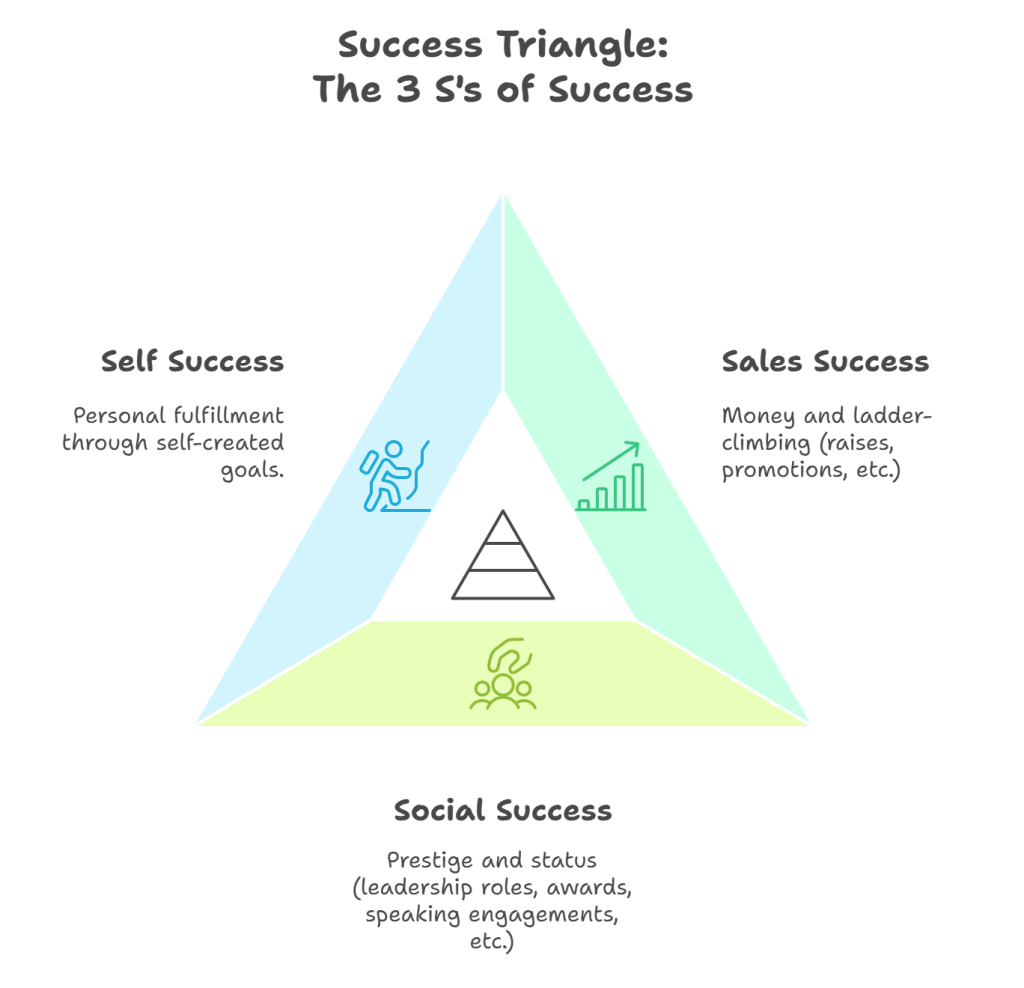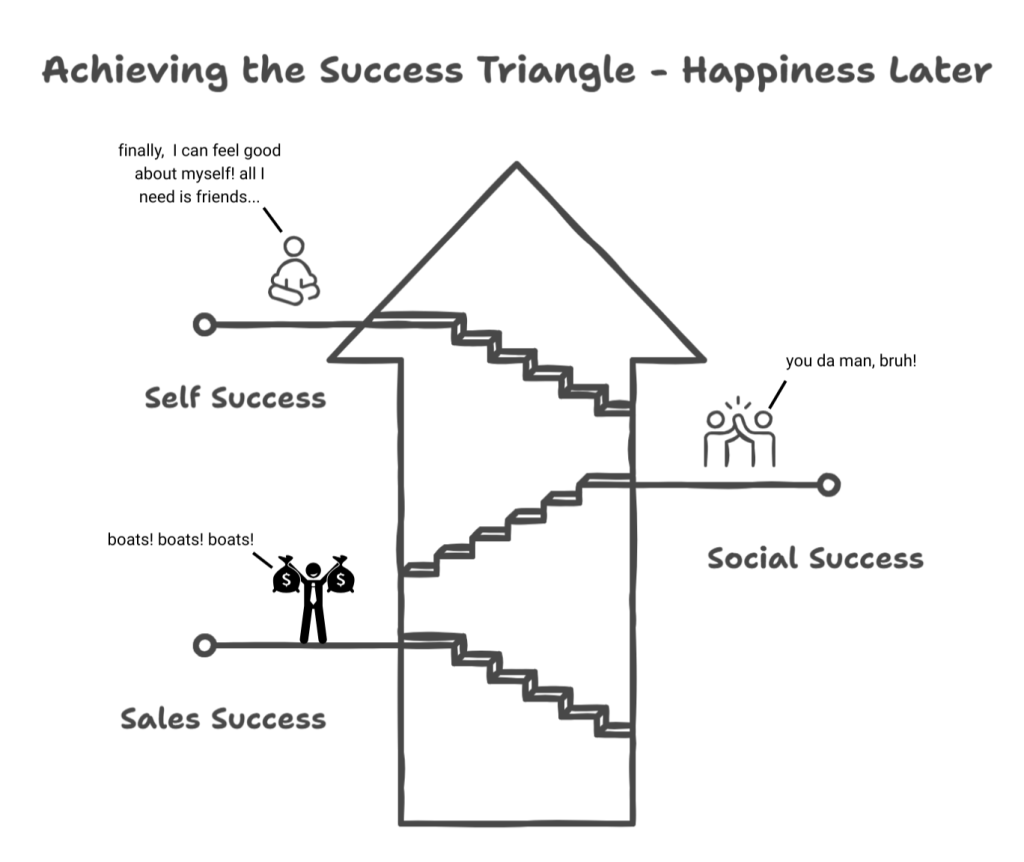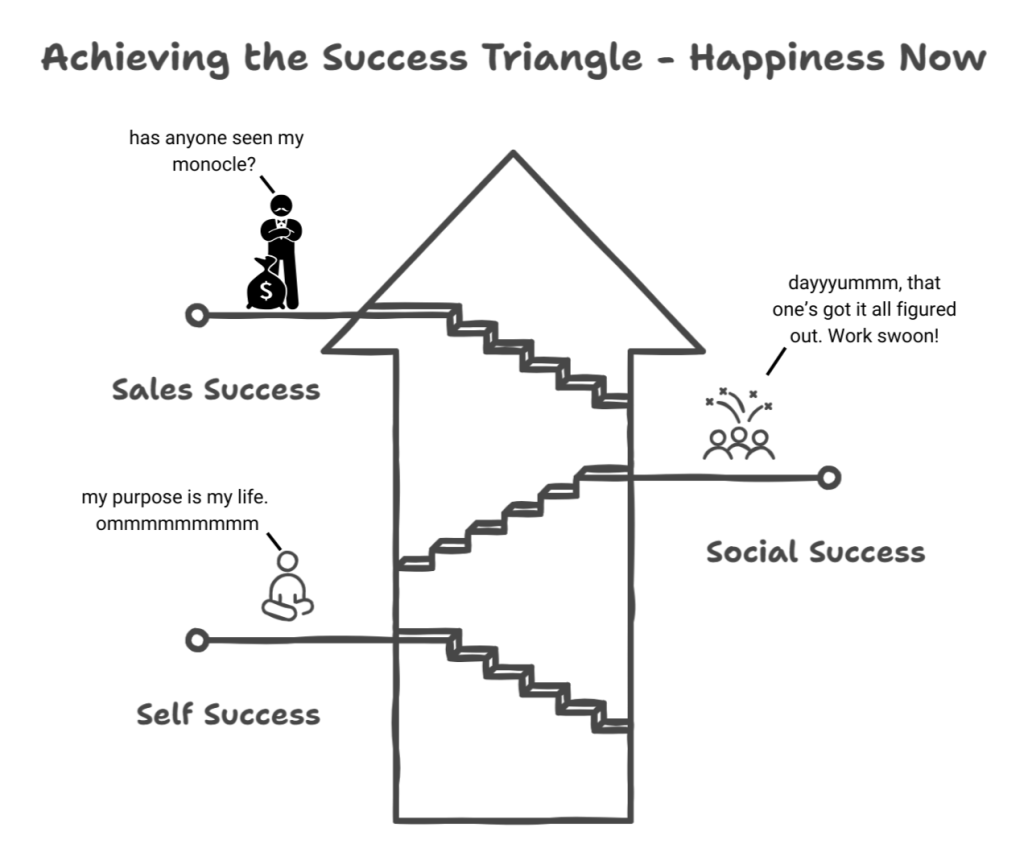There’s a prevailing narrative about happiness and work that’s worth picking apart.
We are told by well-meaning mentors, from parents to teachers to overlings, that we should focus on work now so we can live better later.
As the story goes, climbing the job ladder is how our most youthful/productive years should go, since this will act as a prelude to the status and income that will open a window to happiness.
Work first, then fall in love, then work more, then family, then work more, then happy. This is the “deferred living” mindset, the idea that “less happy” is okay for a little while.

But is this really how the flow of the good life goes when it comes to work?
Neil Pasricha’s Success Triangle
In The Happiness Equation, Neil Pasricha tells a story about meeting an aspiring writer who asks about his secret to professional success. To give her a visual, Neil scribbled his “success triangle” onto a napkin.
It looked like this:

For Neil, there are “3 S’s of success” that make up the triangle: sales, social, and self. Here’s what they mean to me:
- Sales success means money and ladder climbing. What do you accomplish at work and how is it recognized? This includes raises, promotions, maybe the occasional plaque for “X years of dedicated service.”
- Social success is about prestige and status. Pasricha says this is about “critical success”, coming from people that you respect. Invitations to give talks, mentoring roles, leadership positions, that kind of thing. The day they give you a virtual assistant that speaks solid English is the day you’ve earned respect and social success.
- Self success is about personal fulfillment. This one is entirely between your ears. As Pasricha puts it, “Only you know if you have it.” It means you’ve achieved what you set out to achieve and are now allowed to feel good about your work. (Notice I said “your work.” You should still feel morose about your parenting, sugar addiction, and love handles, just like the rest of us.)
Pasricha told his convo partner that she first needed to decide what kind of professional success she wanted. Then she could pursue that type of success for a while before moving on to the others. Bang, boom, pow, a nice roadmap to fulfillment and happy days.
Now comes the twist
There are 2 problems with the success triangle.
First, the order we chase them. We think we should pursue sales success first, then social, then self—each one sets up the other in a “work now, feel good later” mentality.
It looks like this:

If that works for you, great. I’m not here to yuck your yum. But, for most of us, it’s backward. In fact, studies consistently show that happiness opens the door for productivity and success, not the other way around.
In that case, the flow should look more like this:

The second problem, and the real kicker, is that it’s impossible to have all three. Pasricha himself says that he has yet to see it happen and thinks the prospect is dubious, at best.
Consider a few examples of trading one for the other:
- Putting in extra hours at work to land that promotion (sales) and leadership role (social), only to realize that managing people sucks and you now hate your job (
self). Or that it’s the next promotion that will really make you happy at work (selfagain). - Volunteering to speak at that conference (social) and spending time with your favorite mentors while you’re there (self) leads to subpar work that almost misses the Monday deadline (
sales). - Staying true to your feelings about “X” in a meeting (self) gets you what you want for your department and you can hit your goals (sales). But those feelings are unpopular among colleagues, who now take turns stealing your lunch from the refrigerator (
social).
The last one shows us that sales success and social success aren’t always aligned. Doing the right thing doesn’t always lead to status perks. You’ve gotta hope feeling good about it is enough for you.
As we all know, the journey to both sales success and social success is potentially eternal. There’s always another metric, pay grade, or promotion dangling in front of us. Another accolade from our peers to confirm suspicions of excellence.
It behooves us to recognize this reality and embrace a wild idea: There is no amount of money (sales) and status (social) that justifies putting off feeling good about what you do (self).
Simply put, deferred living can go on forever….if you let it.
What you can do
Pasricha consistently invokes a simple solution for ditching deferred living.
Do it for you.
He writes:
“Don’t do it for others.
It’s hard to compete endlessly because there’s always more to compete with when you get there.
Remember we will always be number two to seven billion at everything in the world. And every level we go up has new peers, new benchmarks, new competitors.
But the next level never ends unless you are literally the best in the entire world.”
It’s that simple. When you do it for you, your sense of purpose, direction, and self-confidence soars. In other words, doing it for you naturally leans into self success, simply because you’ll feel good about what you’ve accomplished (and continue to accomplish).
The best part is that starting with self success will relieve the burdens of sales and social success. You’ll spend less time and energy focusing on those things, because you’re doing it for you and that no longer matters.
You’ll become the Robin Hood of your own life, stealing time from work and giving it back to yourself (or others).
You know what else? You’ll probably actually become more productive and efficient with work when this happens. Dare I say, focusing on self success first will move you closer to sales and social success.
Pasricha should have told the aspiring writer that she should choose self success first. Because, like you, she has no good reason to defer her best life any longer.

